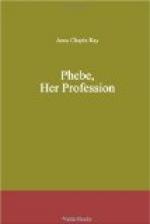“Oh, I’ll risk it. Besides if you don’t take it, there’s a man in Greenway that will.”
Phebe looked at her hostess, shut her teeth, jerked the knot tight, and was silent; but there was a dangerous gleam in her eyes, as she mounted and rode away, with her three-dollar skeleton clattering on the handle-bars before her.
CHAPTER EIGHT
There is a certain inconvenience coupled with being called upon to pose as a genius at the comparatively early age of twenty-six. Popular theory to the contrary, notwithstanding, it is easier to plod slowly along on the path to fame. Greatness does not repeat itself, every day in the week. But fate had overtaken Gifford Barrett, and had hung a wreath of tender young laurels about his boyish brow. He deserved the wreath, if ever a boy did. Two years before, fresh from the inspiration of his years in Germany and of his German master, he had composed his Alan Breck Overture. It would have been well done, even for a man many years his senior, and it quickly won a place on the programmes of the leading orchestra’s of the country. He had known what it was to be called out from his box at the Auditorium or Carnegie Hall to bow to the audience, while the orchestra thumped their approval on their music racks. He had been hailed even as the American Saint Saens, and it was small wonder that he began to feel the wreath too tight a fit for his brows.
His family was well known and, from the first, society had claimed him for her own. He had the gift of talking well, of dancing better; and he had found it easy to drift along from day to day, neglecting his music for the sake of the invitations that poured in upon him. In his more conscientious moments, he told himself that he would do all the better work as the result of seeing the life of his native city; but so far its influence had been only potent to move him to write a triplet of light songs and to dedicate them to three of the prettiest girls in his set, no one of whom was able to sing a note in tune.
At the end of the second season, a reaction set in. The public was clamorous for a new work from him; he was tired of being lionized by people who called his beloved overture pretty. The madness of the spring was upon him, the spirit of work had seized him, and the middle of May found him and his long-suffering piano installed in the “north chamber” of the Sykes homestead at Bannock Bars.
He had chosen the place with some degree of care, in order to be sufficiently remote from society to work undisturbed, sufficiently near civilization to be able to buy more music paper in case of need. Ten miles of even a bad road is not an impassible barrier to an enthusiastic bicyclist; yet the place was as rustic and countrified as if it had been, not ten, but ten hundred miles from an electric light. His digestion was good enough to cope even with Eulaly




